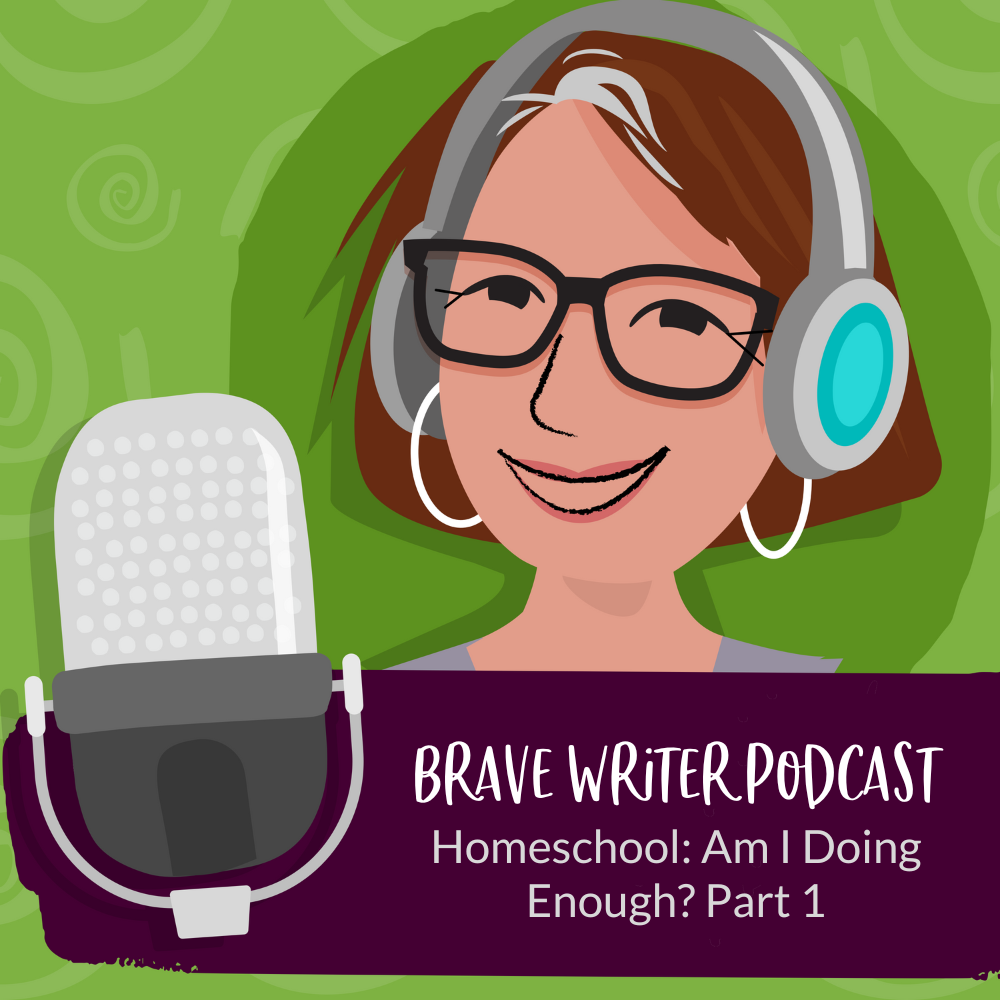Podcast: Am I Doing Enough? Part 1

A question that often comes up repeatedly in the minds of many homeschooling parents is: “Am I doing enough?” We know how stressful it can be — we’ve all been there.
Today on the Brave Writer podcast, we’re going to explore three key aspects to help you navigate the world of “enoughness” in homeschooling:
- what constitutes enough preparation and training for parents,
- determining enough mastery of subject areas for different age groups,
- and understanding how much daily activity is needed in each subject area.
So, let’s dive in and address these concerns together, making homeschooling a more enjoyable and fulfilling journey for both you and your children. This is a two part episode so be sure to come back next time!
Show Notes
Preparation & Training
There are two types of preparation: homeschool philosophy research and homeschool practice. Philosophy research helps us understand the “why” of homeschooling, while practice is focused on the “how” – the actual implementation of education at home.
Balancing these two aspects is crucial for a successful homeschooling experience. It’s easy to get stuck in one area, such as obsessing over homeschooling philosophies or getting overwhelmed with the practical side of things. To create momentum, we need to keep both philosophy and practice in mind, like two pedals on a bicycle.
Research and learning are ongoing processes, and our questions will evolve as our children grow and their needs change. Pay attention to your child’s engagement and progress, as this will guide you toward new resources and ideas.
One approach to balance philosophy and practice is to spend a few weeks:
- researching and making decisions about curriculum,
- interacting with other homeschoolers,
- and reading articles.
Then, live with your choices for a few months before allowing yourself to revisit them. Also, be open to change – it’s not a sign of failure but a way to inject new energy and enthusiasm into the learning process.
Staying curious and observant is key. Notice when your child seems disinterested or restless and be prepared to make adjustments. By maintaining a balance between philosophy and practice, you’ll create a more fulfilling and successful homeschooling journey for both you and your child.
Recognizing Subject Mastery
The journey of determining mastery for various age groups can be broken down into three stages: Pre-K and Kindergarten, first through sixth grade, and the transition to reading.
Pre-K and Kindergarten
For Pre-K and Kindergarten age kids, the focus should be on engaging and entertaining activities. The best curriculum for these little learners includes:
- reading,
- playing games together,
- nature walks,
- and creative activities like finger painting or drawing.
Rotate your book collection to provide variety while allowing your child to enjoy their favorites repeatedly. Mastery at this stage comes from practice and repetition, so don’t worry about always introducing new activities.
First through Sixth Grade
The transition to first through sixth grade can feel daunting as the foundation of learning is reading. It’s essential to recognize that the process of learning to read varies for each child. While some may begin reading at a young age, others may take longer. As a parent, your role is to be a detective in understanding your child’s unique needs and providing support accordingly.
Incorporate a range of strategies to expose your child to reading. For instance:
- use phonics-based programs,
- watch TV with captions,
- and read aloud to them.
If your child is struggling, don’t merely switch from one program to another. Instead, take the time to understand the underlying issue and address it accordingly.
Transition to Self-Led Reading
The goal by the sixth grade is for reading to become a useful tool in your child’s life. This doesn’t mean they have to love reading, but they should be able to use it as a means for self-education. Continue to read aloud to your child, even if they are reading independently, and encourage a family reading habit.
Create opportunities for your child to connect with books, such as designated quiet reading times or a cozy book nook. Remember that the process of learning to read is not just about mastering a subject but also about experiencing the pleasure and benefits that reading offers.
Determining mastery for different age groups and different subjects involves understanding each child’s unique needs and providing support accordingly. Be patient, as every child’s learning journey is different, and focus on creating a nurturing and engaging environment for your child to develop and enjoy reading.
Listen to next week’s episode for more.
There’s still lots to discuss on this topic! We’re going to continue with middle school and high school benchmarks, and then move into how much time to spend on each subject. This is a two part episode so be sure to come back next time!
Resources
- Looking for a new math program? Get a free trial of CTCMath.com today to get a free trial.
- Get 10% off our Growing Brave Writers program using code GBWPOD10 at https://store.bravewriter.com/products/growing-brave-writers
- Sign up for our Text Message Pod Ring to get podcast updates and more!
- Send us podcast topic ideas by texting us: +1 (833) 947-3684
- Want help getting started with Brave Writer? Go to bravewriter.com/getting-started
- Sign up for the Brave Writer newsletter to learn about all of the special offers we’re doing in 2022 and you’ll get a free seven-day Writing Blitz guide just for signing up: http://go.bravewriter.com/writing-blitz
Connect with Julie
- Instagram: instagram.com/juliebravewriter
- Twitter: twitter.com/bravewriter
- Facebook: facebook.com/bravewriter


















